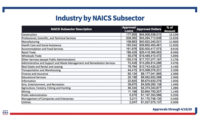Coronavirus and Construction
Update: Construction Tops Industries in Paycheck Protection Loan Volume
But SBA says all of the program's funding was exhausted by April 16

Chart shows distribution of SBA loans by industry as classified by the North American Industry Classification System. Image courtesy U.S. Small Business Administration
Construction ranks first among industries in the dollar volume of loans approved in a much-sought-after federal stimulus loan program aimed at helping small businesses survive during the economic slump, the U.S. Small Business Administration has reported.
But the Paycheck Protection Program, created in the Coronavirus Aid, Relief and Economic Security, or CARES, Act, has exhausted all of the $349 billion that the law provided for the loans. Negotiations about replenishing the program's funding and perhaps providing funds for other uses, such as state and local governments, were continuing, according to Senate Minority Leader Chuck Schumer (D-N.Y.).
According to updated data from the SBA on April 17, construction companies had a total of $44.9 billion in approved Paycheck Protection Program loans, through April 16, when the program's funding ran out. Construction's sum represents 13.1% of total PPP loan dollars approved by that date.
[For ENR’s latest coverage of the impacts of the COVID-19 pandemic, click here]
Construction ranks fourth among industries in terms of the number of approved PPP loans, with 177,905.
The professional, scientific and technical services category ranks first in number of loans approved, with 208,360, followed by retail trade, with 186,429, and health care and social assistance, with 183,542.
Companies with 500 or fewer employees or that meet SBA’s revenue-based definition of a small business are eligible for the PPP loans. Nonprofit organizations are eligible, too. Prospective borrowers apply to banks, credit unions and other lenders.
The program requires borrowers to use all of the loan proceeds for payroll, health insurance premiums and other basic expenses and 75% of the total on payroll alone. If a borrower meets those requirements, the SBA will forgive the loan, turning it into a grant, in effect.
But the SBA announced on April 16 that it had committed all of that money as of late that morning. The program was launched on April 3, less than two weeks earlier.
Schumer: Talks continuing about additional funds
Key congressional lawmakers and Treasury Dept. officials are negotiating over "refilling" PPP's funds and perhaps adding funding for other programs, Schumer said in a CNBC interview on April 17.
According to a transcript, Schumer said that discussions were continuing among his staff, along with aides to House Speaker Nancy Pelosi (D-Calif.) and Treasury Secretary Steven Mnuchin about additional funds.
'We have had constructive talks," Schumer said. "They're going to continue through the weekend, and I don't see any reason why we can't come to an agreement soon."
Republicans and Democrats agree that PPP needs additional funding. The Trump administration has requested a $250-billion infusion.
Democratic leaders support adding to the PPP funds but want to set aside some of the dollars for lenders in underserved communities.
Democrats also are calling for $150 billion for state and local governments, which are facing major revenue shortfalls, plus $150 billion for hospitals, which are dealing with equipment shortages and a heavy influx of coronavirus patients. [View 4/9/2020 ENR story here.]
Factors behind construction's PPP results
Construction's standing among industry sectors in receiving PPP loan dollars might be traceable at least in part to the industry's having so many small firms—more than nearly all other industries.
Census Bureau figures from 2017 show that construction had 700,393 small firms (those having fewer than 500 employees).
Professional/Scientific/Technical Services had even more small firms, with 807,932. But construction outranked health care/social assistance (650,689), retail trade (645,685) and manufacturing (244,098).
Brian Turmail, a spokesman for the Associated General Contractors of America, said via email that the PPP loans "are designed to help firms retain staff, and the construction industry is one of the few industries that is actually able to work and has staff they need to retain."
Turmail adds that AGC's data indicates its member firms "are seeing a lot of projects getting cancelled and delayed, so they need the support of the PPP loans to keep their teams intact."
He says, "We also think that construction firms understand how hard it is to get back people they let go, based on their experiences in 2006-2010, and don't want a repeat of that, so are eager to do whatever they can to retain talent."
Story updated on 4/17/20 with new figures from SBA, comments from Sen. Chuck Schumer and Associated General Contractors of America.


